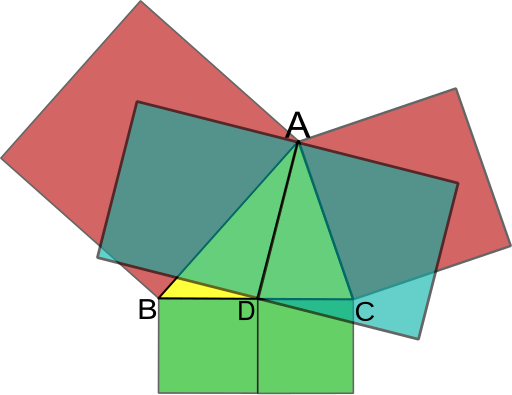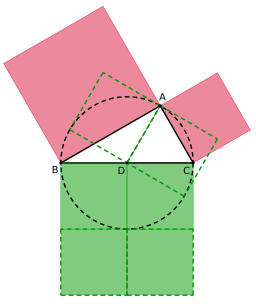In geometry, Apollonius's theorem is a theorem relating the length of a median of a triangle to the lengths of its sides. It states that "the sum of the squares of any two sides of any triangle equals twice the square on half the third side, together with twice the square on the median bisecting the third side".
green/blue areas = red areaSpecifically, in any triangle ABC, if AD is a median, then
{\displaystyle |AB|^{2}+|AC|^{2}=2(|AD|^{2}+|BD|^{2}).}
It is a special case of Stewart's theorem. For an isosceles triangle with |AB| = |AC|, the median AD is perpendicular to BC and the theorem reduces to the Pythagorean theorem for triangle ADB (or triangle ADC). From the fact that the diagonals of a parallelogram bisect each other, the theorem is equivalent to the parallelogram law.
The theorem is named for the ancient Greek mathematician Apollonius of Perga.
Pythagoras as a special case:
green area = red area
Proof
Proof of Apollonius's theorem
The theorem can be proved as a special case of Stewart's theorem, or can be proved using vectors (see parallelogram law). The following is an independent proof using the law of cosines.[1]
Let the triangle have sides a, b, c with a median d drawn to side a. Let m be the length of the segments of a formed by the median, so m is half of a. Let the angles formed between a and d be θ and θ′, where θ includes b and θ′ includes c. Then θ′ is the supplement of θ and cos θ′ = −cos θ. The law of cosines for θ and θ′ states that
\begin{align} b^2 &= m^2 + d^2 - 2dm\cos\theta \\ c^2 &= m^2 + d^2 - 2dm\cos\theta' \\ &= m^2 + d^2 + 2dm\cos\theta.\, \end{align}
Add the first and third equations to obtain
{\displaystyle b^{2}+c^{2}=2(m^{2}+d^{2})}
as required.
References
Godfrey, Charles; Siddons, Arthur Warry (1908). Modern Geometry. University Press. p. 20.
External links
Apollonius Theorem at PlanetMath.org.
David B. Surowski: Advanced High-School Mathematics. p. 27
vte
Ancient Greek and Hellenistic mathematics (Euclidean geometry)
Mathematicians
(timeline)
Anaxagoras Anthemius Archytas Aristaeus the Elder Aristarchus Apollonius Archimedes Autolycus Bion Bryson Callippus Carpus Chrysippus Cleomedes Conon Ctesibius Democritus Dicaearchus Diocles Diophantus Dinostratus Dionysodorus Domninus Eratosthenes Eudemus Euclid Eudoxus Eutocius Geminus Heliodorus Heron Hipparchus Hippasus Hippias Hippocrates Hypatia Hypsicles Isidore of Miletus Leon Marinus Menaechmus Menelaus Metrodorus Nicomachus Nicomedes Nicoteles Oenopides Pappus Perseus Philolaus Philon Philonides Porphyry Posidonius Proclus Ptolemy Pythagoras Serenus Simplicius Sosigenes Sporus Thales Theaetetus Theano Theodorus Theodosius Theon of Alexandria Theon of Smyrna Thymaridas Xenocrates Zeno of Elea Zeno of Sidon Zenodorus
Treatises
Almagest Archimedes Palimpsest Arithmetica Conics (Apollonius) Catoptrics Data (Euclid) Elements (Euclid) Measurement of a Circle On Conoids and Spheroids On the Sizes and Distances (Aristarchus) On Sizes and Distances (Hipparchus) On the Moving Sphere (Autolycus) Euclid's Optics On Spirals On the Sphere and Cylinder Ostomachion Planisphaerium Sphaerics The Quadrature of the Parabola The Sand Reckoner
Problems
Angle trisection Doubling the cube Squaring the circle Problem of Apollonius
Concepts/Definitions
Circles of Apollonius
Apollonian circles Apollonian gasket Circumscribed circle Commensurability Diophantine equation Doctrine of proportionality Golden ratio Greek numerals Incircle and excircles of a triangle Method of exhaustion Parallel postulate Platonic solid Lune of Hippocrates Quadratrix of Hippias Regular polygon Straightedge and compass construction Triangle center
Results
In Elements
Angle bisector theorem Exterior angle theorem Euclidean algorithm Euclid's theorem Geometric mean theorem Greek geometric algebra Hinge theorem Inscribed angle theorem Intercept theorem Pons asinorum Pythagorean theorem Thales's theorem Theorem of the gnomon
Apollonius
Apollonius's theorem
Other
Aristarchus's inequality Crossbar theorem Heron's formula Irrational numbers Menelaus's theorem Pappus's area theorem Ptolemy's inequality Ptolemy's table of chords Ptolemy's theorem Spiral of Theodorus
Centers
Cyrene Library of Alexandria Platonic Academy
Other
Ancient Greek astronomy Greek numerals Latin translations of the 12th century Neusis construction
Undergraduate Texts in Mathematics
Graduate Studies in Mathematics
Hellenica World - Scientific Library
Retrieved from "http://en.wikipedia.org/"
All text is available under the terms of the GNU Free Documentation License




